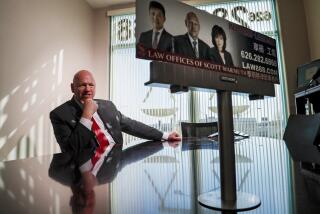U.S. Firms Set Up Operations in Peking : China Is Getting a Taste of P.R., Western-Style
- Share via
PEKING — In some ways, bringing the public relations business to China is like bringing chopsticks to Peking.
In its rudimentary aspects, at least, the Chinese are already masters of the art of public relations.
When it comes to putting the best face on things, to making the proper gesture, to organizing a ceremony and to making the right seating arrangements, China was in the public relations business long before the invention of the press release.
“With the thoughtfulness in how they do things, the Chinese could give lectures on the subject right now,” said Robert S. Leaf, London-based president of Burson-Marsteller International, the overseas arm of the giant American public relations firm. “The Chinese are natural public relations people.”
Nevertheless, since the beginning of this year, the two largest American public relations companies, Burson-Marsteller and Hill & Knowlton, have started operations in China. Both firms say they hope to get public exposure for their American clients here and also, perhaps, to help teach the Chinese the skills of modern, Western-style public relations.
“We’re probably in every other market already. We’re the world’s largest public relations firm and we’ve got to be on the cutting edge of this business,” said Leaf, who was in China recently for ceremonies to begin his company’s efforts here.
Interestingly, the two giant public relations competitors have taken quite different approaches in China. Hill & Knowlton, which opened the first public relations office in Peking last January, has what amounts to a fairly typical foreign business operation here. Three expatriates and one locally hired employee work together in a small room at the Peking-Toronto Hotel, cranking out press releases and organizing receptions and conferences.
“At first, we had to explain to people here what a press release was,” said Ronald P. Cromie, director of Hill & Knowlton’s China office. “On several occasions, Chinese news media would try to pay for a press release. They’d send us a check in the mail for three, four, five renminbi (about $1 or $2). Of course, we would send the checks back.”
By contrast, Burson-Marsteller will have none of its own employees stationed here. Instead, the company entered into a deal under which a subsidiary of the New China News Agency, China’s government-owned wire service, will handle Burson-Marsteller’s public relations business in China. Under the agreement, signed Aug. 31, China Media Development Inc., the marketing arm of the New China News Agency, and Burson-Marsteller set up a new company called China Global Public Relations to work in China for Burson-Marsteller’s corporate clients. Burson-Marsteller will pay China Media Development a monthly fee, the size of which was not divulged.
Leaf said that Burson-Marsteller decided two years ago that it did not want to open its own office in Peking. “We did not have the kind of infrastructure we have in our Hong Kong office,” he said. Other company officials said many U.S. corporations base their China divisions in Hong Kong, and Burson-Marsteller wanted to be near potential clients there.
Hooking up with an offshoot of the New China News Agency gives Burson-Marsteller an opportunity to suggest that it will have the inside track with China’s largest news organization. When pressed, however, Burson-Marsteller officials say they doubt that their connection with the official government news agency will get them access to any inside information about China’s economy or market trends.
“I don’t think we’ll be privy to anything confidential,” said Godfrey Scotchbrook, regional director of the company’s Hong Kong office. Burson-Marsteller officials say that China Global Public Relations will be able to put on technical seminars, publish brochures for the China market, organize press conferences, gather information and conduct direct-mail campaigns in China.
Leaf said his company also will now be better able to offer advice to foreign businessmen about Chinese customs. “What can you give as a gift? When do you give it and who do you give it to? Companies don’t want to make a mistake,” he said.
Of course, many American firms employ their own China experts to give them such advice, but Burson-Marsteller hopes to attract companies that are just beginning to consider entering the China market.
At both Hill & Knowlton and Burson-Marsteller, officials insist that their own approach to public relations in China is the correct one.
“China is important for our clients, so it’s important to have a presence here,” Hill & Knowlton’s Cromie said. “Marketing is something new to the Chinese. We feel we have to do it ourselves. I don’t think any joint venture, much less one with Xinhua, could do it.”
More to Read
Inside the business of entertainment
The Wide Shot brings you news, analysis and insights on everything from streaming wars to production — and what it all means for the future.
You may occasionally receive promotional content from the Los Angeles Times.










